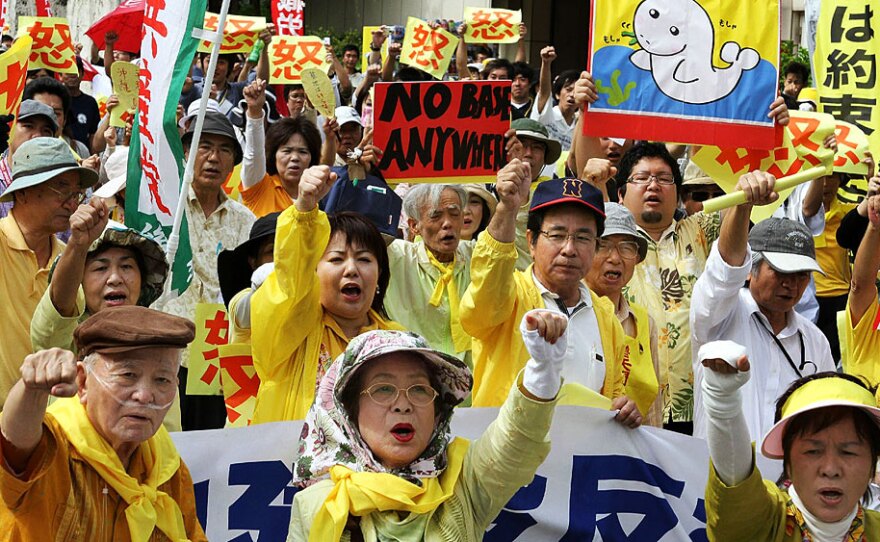In Japan, the problem that led to the dissolution of former Prime Minister Yukio Hatoyama's government now is vexing the new government.
Earlier this month, Hatoyama resigned over the controversy about the continued presence of thousands of U.S. troops stationed on the Japanese island of Okinawa. He promised but failed to bring about their relocation.
We cannot see what he really wants to do on this issue.
The new government in Tokyo is facing the same problem with little prospect of a solution.
Many of the 18,000 U.S. Marines based in Japan are located at the Marine Corps Air Station Futenma on Okinawa. Over the years, Okinawans have pressed harder and harder to move the base away from their island.
After the opposition Democratic Party of Japan pulled off a historic electoral victory last year, Hatoyama got caught by promises to close the base that he couldn't keep. He resigned after only eight months in office.
His successor, Naoto Kan, took office earlier this month. It is not clear how he will deal with the problem of Okinawa, says political analyst Masatoshi Honda of the National Graduate Institute for Policy Studies.
"He hasn't made any clear statement about Futenma before and even right now. He just said he will follow the decision of the previous prime minister. So we cannot see what he really wants to do on this issue," Honda says.

U.S. Presence A Sore Point
The Marine base at Futenma has been a sore point between the U.S. and Japan for years. The noise of the base's aircraft and the rowdy and drunken behavior of some Marines have made the base unpopular in Okinawa and elsewhere in Japan.
Several times in recent years, the U.S. offered a proposal to solve the problem, but it would still leave much of Futenma intact, says Koichi Nakano, a political analyst at Sophia University.
"The U.S. government [has] repeatedly said that [it wants] to relocate to a place where [it] will be welcome. That welcome is simply not there in Okinawa at the moment," Nakano says.
The U.S. says it will transfer 8,000 Marines to Guam and move a portion of the base to another part of Okinawa.
Kan, the new prime minister, has pledged to seek a solution that is in line with this offer, but he still faces overwhelming opposition on Okinawa, Honda says.
"So far mayors, governors and local politicians in Okinawa, everybody [is] against the proposal of the new government. So he will be completely blocked by this," he says.
Seeking A More Equal Relationship With U.S.
Last month, 17,000 Okinawans formed a human chain around the base in protest.
Part of the problem is the feeling on Okinawa that its people bear a disproportionate burden of the continued American military presence in Japan. The small island represents less than 1 percent of Japan's population, but it maintains some three-quarters of the U.S. military forces in Japan.
Last year the Democratic Party of Japan overturned decades of political control by the Liberal Democratic Party, in part by pledging to seek a new, more equal relationship with the United States.
But when Hatoyama became prime minister, the U.S. treated him arrogantly, Nakano says.
"Initially, the American government came across as very high-handed and, in fact, even contemptuous of the change of government that took place in Japan, the historical alternation in power," he says. "So it came across as if it was neglecting the democratic will of the Japanese, and treating it as basically a dependency of the United States."
A Sensitive Matter Of Self-Defense
The U.S. has maintained bases on Okinawa since the World War II battle there in the spring of 1945. It was the bloodiest land battle of the war in the Pacific. The U.S. kept military control of Okinawa until 1972, 20 years after the rest of Japan regained its sovereignty.
That history has a lot to do with the sensitivity of all sides in the current controversy. The Futenma affair has sparked a debate in Japan about the ongoing presence of U.S. forces.
In a recent interview with the BBC, the current Foreign Minister Katsuya Okada, speaking through an interpreter, pointed out that Japan's constitution limits how its self-defense forces can be used, and how the continued presence of U.S. forces acts as a deterrent to potential conflicts with North Korea or China.
"For Japan's own security and to maintain peace and stability in Asia as well, we do need U.S. forces in Japan, and that position is not going to change, even with the change in government," Okada said.
But this is not a position that all Japanese support.
In order to handle the matter successfully, Kan, the new prime minister, will have to explain that need better to the Japanese people, say some analysts.
Narushige Michishita, a specialist in strategic and defense studies at the National Graduate Institute for Policy Studies, says Kan needs to address the issue of defending Japan. Michishita is sympathetic to the U.S. position, but he believes it will be difficult for Kan to convince the Japanese, especially the people of Okinawa, of the dangers Japan may face that require a large U.S. military presence.
"In a way he has been a little bit exaggerating the need for U.S. troops in Okinawa for the defense of Japan at the current moment," Michishita says.
Copyright 2022 NPR. To see more, visit https://www.npr.org. 9(MDAzMjM2NDYzMDEyMzc1Njk5NjAxNzY3OQ001))







